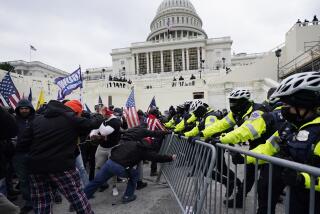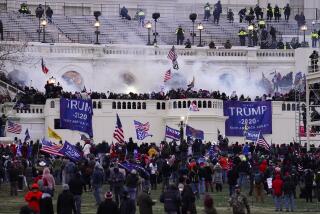Violating $10,000 Cash Limit Not a Crime, Justices Rule : Law: Supreme Court says government needed to prove a gambler knew he was breaking the statute. He paid a casino debt with a series of $9,000 checks.
WASHINGTON — In a setback for the government’s effort to police money laundering, the Supreme Court ruled Tuesday that a person cannot be convicted of a crime just for deliberately skirting a requirement to report cash transactions of $10,000 or more.
Instead, a prosecutor must prove that the person knew he was violating the law by breaking up the transactions into lesser amounts to avoid having them reported to the government.
The 5-4 decision throws out the conviction of a Portland, Ore., restaurant owner and part-time gambler who paid off a $160,000 casino debt in Reno with a number of cashier’s checks, all of which were for amounts slightly less than $10,000.
Based on this action alone, gambler Waldemar Ratzlaf was convicted of evading the federal reporting requirements, sentenced to 15 months in prison and fined $26,300.
But the justices concluded that he was not proven guilty of “willfully violating” the law, as Congress specified. Certainly Ratzlaf knew a $10,000 transaction would trigger the reporting requirement, but he did not know that drawing a series of $9,000 checks from different banks to avoid the requirement was itself a criminal act, the court said.
“We do not dishonor the venerable principle that ignorance of the law generally is no defense to a criminal charge,” said Justice Ruth Bader Ginsburg for the majority. “In particular contexts, however, Congress may decree otherwise,” she added.
As a general matter, some crimes are so obvious--stealing, for example--that violators cannot contend they were unaware their actions were illegal. But in the growing number of complex regulatory laws that make otherwise legal behavior a crime, both Congress and the high court have set a higher threshold for judging guilt.
Two years ago, for example, the court gave tax protesters a surprising victory by ruling that they cannot be convicted of criminal tax evasion unless prosecutors prove that they knowingly and willfully violated the law.
In 1970, Congress first required financial institutions to report large cash transactions to the Treasury Department. The law includes transactions that are the equivalent of cash, such as those made with cashier’s checks. Legislators wanted to track the flow of cash from the drug trade as well as stop ordinary tax cheating by making it harder to hide the money. The law was stiffened in the Money Control Laundering Act of 1986 to also make evading the reporting requirement illegal.
As Ginsburg noted, however, the law says that it punishes only those who “willfully violate” its provisions. That requirement “mandates something more” than evidence that a person restructured his transactions, she said. “The government must prove the defendant acted with knowledge that his conduct was unlawful,” she concluded in the case (Ratzlaf vs. United States, 92-1196).
Tuesday’s decision comes as a mild surprise. Ten of 11 circuit courts that had considered this issue had sided with the government, including the U.S. Court of Appeals in San Francisco, which affirmed Ratzlaf’s conviction. The judges said that if a person deliberately evaded the reporting requirement, that was enough to justify a guilty verdict.
The ruling also marks the second time in a row that the justices on a 5-4 vote have reversed a decision in a criminal case. Last month, on the day before adjourning for its holiday recess, the justices overturned the seizure of a drug dealer’s home and property because he had not been given a hearing in advance.
Ginsburg’s opinion in the money laundering case was joined by Justices John Paul Stevens, Antonin Scalia, Anthony M. Kennedy and David H. Souter.
Speaking for the dissenters, Justice Harry A. Blackmun said that Ratzlaf “will be laughing all the way to the bank.”
Undoubtedly, the ruling will make it somewhat harder for officials to track and punish tax cheats and drug criminals, as well as those who deal with them.
In this case, lawyers for Ratzlaf said that he generated a large amount of cash from his Portland restaurant. Government prosecutors labeled him a “high stakes gambler” and said that they suspected he had evaded paying income taxes on his winnings.
More to Read
Get the L.A. Times Politics newsletter
Deeply reported insights into legislation, politics and policy from Sacramento, Washington and beyond. In your inbox three times per week.
You may occasionally receive promotional content from the Los Angeles Times.











